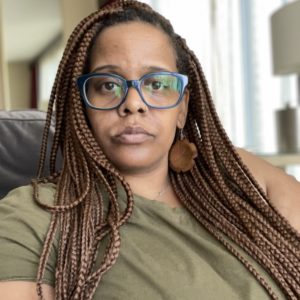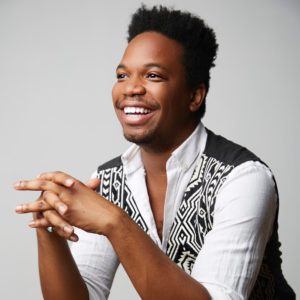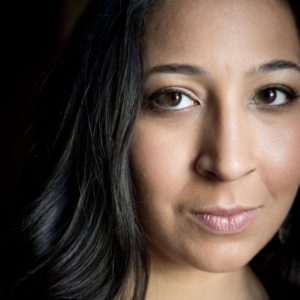CHICAGO: After two months at the helm, artistic director Ken-Matt Martin (he/him) has announced the new members of the Victory Gardens Playwrights Ensemble, as well as new plans for how the ensemble will function moving forward. Playwrights Marisa Carr, Keelay Gipson, Isaac Gómez, and Stacey Rose will join the ensemble for a three-year term, through 2024. Their tenure will include a guaranteed world premiere at Victory Gardens, a reading during the Ignition Festival of New Plays, and access to Victory Gardens’ artistic department meetings and board meetings. The four playwrights will also join with Martin at the end of their tenure to help select the next cohort to enter the ensemble.
This decision follows a listening tour by Martin during which he had one-on-one meetings with a variety of Victory Gardens stakeholders, including current and former staff and board members, past Playwrights Ensemble members (including members of VG’s original ensemble), and various other artists who have worked at the theatre in varying capacities. In an interview earlier this week, Martin said he had spoken to around 96 people and was looking to reach 200 before the end of July. These interviews, he said, were an effort to get a deeper understanding of the institution he now leads as well as the hopes and desires people have for Victory Gardens—including many that may have previously been unfulfilled.
“I truly believe you have to understand where the heck you’re coming from before you can decide where in the world you’re going,” said Martin.
During the interview phase of the hiring process, Martin had the idea that he wanted to figure out a way to be the last artistic director of the company who would make unilateral, behind-closed-doors decisions for the company. He acknowledged that, especially in the Chicago theatre community, this storied ensemble can be a controversial subject. After all, this announcement comes 13 months after Victory Gardens’ previous Playwrights Ensemble resigned in protest following the controversial choice to combine the company’s leadership positions rather than hire a replacement for outgoing artistic director Chay Yew (who had weathered his own ensemble-related controversy early in his tenure). That decision was criticized by many in the artistic community for its lack of transparency.

The new program, Martin emphasized, is an effort to bring more transparency to the organization, and it’s a decision that he said has been enthusiastically received across the board during his listening tour. During these conversations, he opened the door for those who hold Victory Gardens dear to poke holes in his idea, in an effort to make sure there was a truly good feeling around this fundamental structural change to Victory Gardens’ most well-known program.
“Any time you’re trying to put structure to anything,” Martin admitted, “you’re automatically putting yourself in a position where you’re not going to be able to serve as many people as you want immediately, which sucks. Yet at the same time, thinking about capacity and what’s doable for us, that’s how we came to this structure.”
Martin also acknowledged the burnout that is afflicting the industry (as well as the country as a whole), especially the pressures that are put on entry and mid-level positions, when talking about the decision to only go with four writers for the program. Though the ensemble is reduced in size—it was often as large as eigth members, who had seven-year residencies—Martin noted that he heard during his tour that there had bee a nebulous structure surrounding previous iterations of the ensemble. Though it was once a larger group, there wasn’t necessarily equity among the group’s members around production or developmental guarantees, or support that some artists may have wanted. Thus Martin wanted to be meticulous about the process, program, and opportunities.
In terms of this selection process, which differs from the process that will be in place moving forward, Martin said he read through plays with literary manager Kat Zukaitis, whom Martin referred to as his partner through this process, and tried to find writers whose work he respected but whom he perhaps hadn’t had extensive chances to work with in the past. Now that these four playwrights have joined the ensemble, the hope is to build relationships that last far beyond the three years of their tenure.

For playwright Stacey Rose (she/her), the idea of working with Victory Gardens has been an exciting prospect since she was in graduate school at NYU Tisch School of the Arts. This chance is one that feels full circle for her, and the Charlotte, N.C.-based writer said she looks forward to being able to spend more time in Chicago and be able to grow roots within its theatre community.
“The only thing I’ve ever experienced similar is the Playwrights Center Core Writer program,” said Rose in an interview. “It feels more like an investment, like you’re investing in me as a playwright.”
The program is unique in that it feels like it is building a dialogue between her and the theatre, she said, creating an organic relationship with her work. Rose mentioned how difficult it can be for playwrights to actually get to know theatres and how many times a playwright’s relationship with a theatre might be relegated to submitting a play and never hearing back. This, on the other hand, not only affords playwrights production and developmental opportunities, but also the chance to interact with and impact the theatre on an institutional level.

This similar idea was also brought up by fellow ensemble member Keelay Gipson (he/him). Gipson sees this as a chance for all the playwrights to bring their knowledge to the table and see actual change, breaking down the barrier that tend to exist between how institutions function and make decisions and the artists who are directly affected by those decisions. Gipson, who previously worked with Victory Gardens when his play #NewSlaves was part of the 2019 Ignition Festival, sees this as a potential turning point when it comes to artist representation and inclusion.
“I’m very excited to be the beginning of a new legacy,” said Gipson. “Very rarely in the nonprofit theatre scene do the artistic directors give the keys to the artists they are working with.”
Gipson emphasized the exciting notion that he and the others will have the chance to potentially introduce Victory Gardens to writers that they may know and love that perhaps haven’t had a chance to connect with the theatre before. It’s an opportunity, he said, to lift up people who may just need that extra boost or that foot in the door to reach the next level of their careers.

When looking at this kind of institutional access, Marisa Carr (she/her) said the chance to have access to the theatre’s artistic department meetings and board meetings may provide a clear look behind the decision-making curtain where artists are rarely granted access, let alone potential impact. This shift fits well within a national conversation about who holds power within institutions and how artists can be given more of it. Being granted access and the chance to see and understand how decisions are being made, Carr said, is “radically transparent.”
“This has the potential to be a transformative model for other institutions within the field,” said Carr. “As a working artist, understanding how institutions function, particularly at a leadership level, can feel really opaque and kind of mysterious. I think that artists are at a disadvantage when we don’t understand the finances of how the institutions that we partner with work, when we don’t understand how decisions are being made and what factors artistic directors, managing directors, or board members are weighing when they make decisions.”
It’s an important step in the conversation around sharing power within this institutions, Carr continued, especially as it gives some say into larger programming choices and community engagement as well. In an extra step, Martin told me, Victory Gardens will offer these playwrights an opportunity and pathway to joining the theatre’s board if they’re interested. The end of each playwright’s tenure will also have them automatically included on the review panel for the next cohort, which Martin said will allow them to bring to the table not only their playwriting knowledge, but also their diverse skillsets and backgrounds from throughout their theatrical careers.
What’s tricky about this situation, Martin noted, is that this is just one part of the overall vision he has for the organization. Victory Gardens has a mission that includes creating inclusive theatre experiences that belong to everyone, and it’s certainly fair to acknowledge that a program that includes just four people clearly cannot represent everyone. But this is a first step in a new direction for Martin and his company, he said—a direction that includes creating long-term relationships with these playwrights to provide an artistic home not only for their work, but also their larger ideas.
Ideally, there’s a future where the program grows, with additional funding to include a hefty enough stipend to allow these playwrights the chance to focus exclusively on their writing during their tenure. There are still many more ideas Martin has in his back pocket for this institution as he looks to build long-term, meaningful relationships with the artists who pass through the historic Biograph Theater.
“I’m hopeful that this will still feel like a home for them,” said Martin, looking toward the future end of this cohort’s tenure. “This is an opportunity to operate from a place of abundance, because I can actually provide more concrete opportunities to people over time through this one subset of our programmatic thinking. There are other buckets I’m also thinking through in terms of ways in which we get to support many writers in different fashions. This is just one of them.”
Jerald Raymond Pierce (he/him) is associate editor of American Theatre. jpierce@tcg.org


